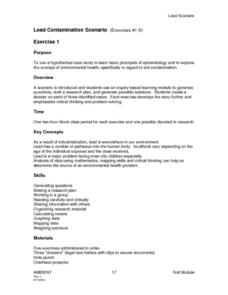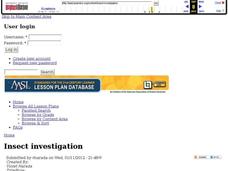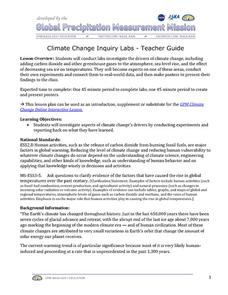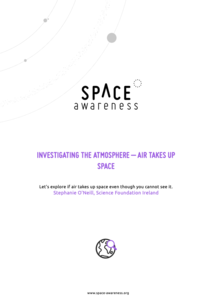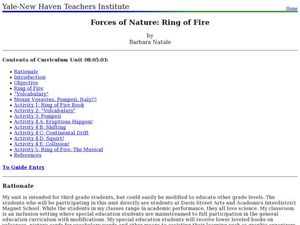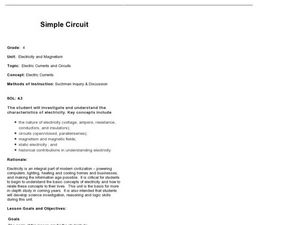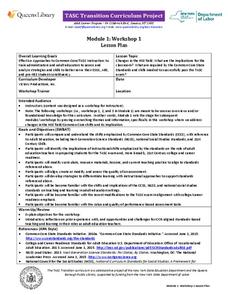Curated OER
Lead Contamination Scenario
Learners are introduced to a scenario, and students use an inquiry-based learning module to generate questions, draft a research plan, and generate possible solutions. They create a dossier on each of three identified cases.
Curated OER
Daphina Science, The Method of Investigation
Students determine what causes a reaction in a species of Daphnia. In this ecology based lesson plan, students are in a hands on project to demonstrate a controlled experiment with data collections. Students use laboratory tools in this...
Curated OER
Insect Investigation
Investigation is a brilliant way to spark scientific inquiry. First graders will identify, research, and report what they have learned about a mysterious bug found on the playground. They will use multimedia resources for research and...
Curated OER
The Birds of a Feather Flock Together
Fifth graders identify all parts of an egg, and explore their importance to the life cycle of a chicken. Learners compare all sorts of birds and place them in categories based on what they look like. This five-day lesson effectively...
NASA
Climate Change Inquiry Lab
With global temperatures on the rise faster than ever recorded, the effects of a heating planet could be devastating. Allow learners to discover just what the world is in store for if the warming continues through a series of videos, a...
Education Development Center
Micro-Geography of the Number Line
Young mathematicians dive into the number line to discover decimals and how the numbers infinitely get smaller in between. They click the zoom button a few times and learn that the number line doesn't just stop at integers. Includes a...
Space Awareness
Investigating the Atmosphere - Air Takes Up Space
How do you know there is air? Can you see it, smell it, feel it? To begin the investigation, learners watch a video and discuss what they know about air and the atmosphere. Then, they participate in five different hands-on, inquiry-based...
Curated OER
Forces of Nature: Ring of Fire
Third graders will research the Ring of Fire and be able to share their findings with their partner. They will also demonstrate volcanic eruptions using a baking soda and vinegar volcano model. Then they will discover how continental...
It's About Time
Exploring Energy Resource Concepts
Please turn off the lights to conserve energy. Or not, after all energy is always conserved. This first lesson in an eight-part series includes three parts. Part A contains one hands-on activity and two inquiry-based experiments on heat...
Concord Consortium
Exploring Hydrophobic Core
How do the hydrophobic and hydrophilic regions of a protein affect its shape? Science scholars explore the molecular properties of protein molecules using a detailed interactive. The resource allows the user to rotate the protein, view...
Purdue University
Global Design for the Seasons
People don't all get the same amount of sun at the same time of the year. Collaborative groups explore how the motion of Earth contributes to the idea in an inquiry-based STEM lesson. Learners first investigate how the rotation of Earth...
Curated OER
The Blue Bottle: An Example of Teacher-Guided Inquiry
Learners observe a demonstration in which a bottle containing a colorless solution is mixed, turns blue, then becomes colorless again. They record observations, form and discuss hypotheses, and draw a conclusion based on the evidence.
NASA
Things Are Not Always What They Seem
Science is magic that works. Magical color-changing beads and a coffee can that follows voice commands are just two examples of magic tricks that rely on science. After completing a hands-on activity and an experiment investigating the...
Howard Hughes Medical Institute
Gorongosa: Making Observations Activity
Do you have young scientists wanting to make new discoveries rather than just completing the same experiments? Young scientists use their observational skills to identify animals and patterns in animal behavior. Through tracking...
Science 4 Inquiry
Expanding the Universe
When Einstein first heard the theory of the expanding universe, he dismissed it as bad physics. Now scholars learn about the theory and how scientists prove it has merit. Through a hands-on simulation and videos, class members measure...
Towson University
Mystery of the Crooked Cell
Can your class solve the Mystery of the Crooked Cell? Junior geneticists collaborate to learn about sickle cell anemia in a fascinating lesson plan. The included materials help them to examine the genetic factors behind the disease...
Curated OER
Magnetism
Second graders conduct a variety of inquiry based learning activities. In this magnetism lesson plan, 2nd graders explore magnets with a partner, they learn the terms attract and repel, examine the poles of a magnet, and complete other...
Curated OER
Simple Circuit: Electric Currents and Circuits
Through inquiry and exploration, 4th graders will learn and understand the functions of open and closed circuits. They will break into 2 groups, define vocabulary, hypothesize how to light a bulb, then test their hypothesis 4 different...
Curated OER
Deformed Frogs! - The Parasite Hypothesis
This project provides young scholars the opportunity to investigate parasites as a possible cause of the observed frog deformities. It asks students to view web-based evidence and interpret whether it supports the parasite hypothesis....
Out-of-School Time Resource Center
Nutrition and Physical Activity
Emerging nutritionists explore what it means to be healthy. In the beginning of the unit, your class will examine the five food groups and learn how food gets from the farm to our plates. This leads into the investigation of the...
EduGAINs
Understanding Viscosity through Investigation and Comparison of Fluids
Not all liquids are the same. Investigate the viscosity of different fluids with a series of activities designed for eighth grade science. As learners move through learning centers with different experiment setups, they determine the...
Cornell Lab of Ornithology
Amazing Birds
What's so amazing about birds? Find out just how amazing birds are with a physics of animal behavior unit created by Cornell Lab of Ornithology. Have learners explore and tap into their observational skills and notice how birds fly, what...
New York State Education Department
TASC Transition Curriculum: Workshop 1
Work out your core, Common Core State Standards, through the first workshop in a series of 15 designed for educators. Inquiry-based activities designed for all content areas and grade levels explore the shifts to new standards,...
EngageNY
TASC Transition Curriculum: Workshop 15
What do a cheetah, Audi commercial, and air have in common? They're all topics of an engaging inquiry-based, hands-on workshop for educators about background knowledge, reading strategies, the CER model, and argumentative writing. The...


